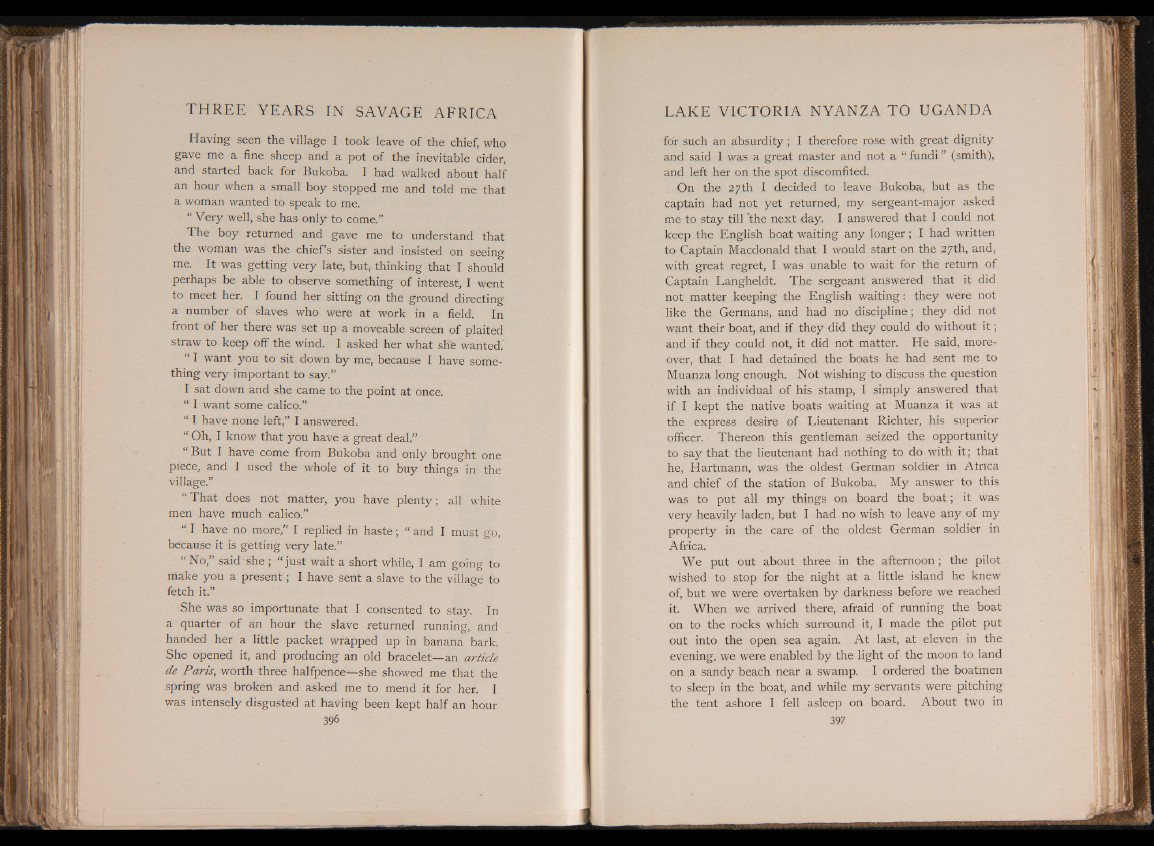
Having seen the village I took leave of the chief, who
gave me a fine sheep and a pot of the inevitable cider,
and started back for Bukoba. I had walked about half
an hour when a small boy stopped me and told me that
a woman wanted to speak to me.
“ Very well, she has only to come.”
The boy returned and gave me to understand that
the woman was the chief’s sister and insisted on seeing
me. It was getting very late, but, thinking that I should
perhaps be able to obsefve something of interest, I went
to meet her. I found her sitting on the ground directing
a number of slaves who were at work in a field. In
front of her there was set up a moveable screen of plaited
straw to keep off the wind. I asked her what she wanted.
“ I want you to sit down by me, because I have something
very important to say.”
I sat down and she came to the point at once.
“ I want some calico.”
“ I have none left,” I answered.
“ Oh, I know that you have a great deal.”
“ But I have come from Bukoba and only brought one
piece, and I used the whole of it to buy things in the
village.”
“ That does not matter, you have plenty; all white
men have much calico.”
“ I have no more,” I replied in haste; “ and I must go,
because it is getting very late.”
“ No,” said she ; “ just wait a short while, I am going to
make you a present; I have sent a slave to the village to
fetch it.”
She was so importunate that I consented to stay. In
a quarter of an hour the slave returned running, and
handed her a little packet wrapped up in banana bark.
She opened it, and producing an old bracelet—an article
de Paris, worth three halfpence—she showed me that the
spring was broken and asked me to mend it for her. I
was intensely disgusted at having been kept half an hour
396
for such an absurdity; I therefore rose with great dignity
and said I was a great master and not a “ fundi” (smith),
and left her on the spot discomfited.
On the 27th I decided to leave Bukoba, but as the
captain had not. yet returned, my sergeant-major asked
me to stay till ’the next day. I answered that I could not
keep the English boat waiting any longer; I had written
to Captain Macdonald that I would start on the 27th, and,
with great regret, I was unable to wait for the return of
Captain Langheldt. The sergeant answered that it did
not matter keeping the English waiting: they were not
like the Germans, and had no discipline; they did not
want their boat, and if they did they could do without i t ;
and if they could not, it did not matter. He said, moreover,
that I had detained the boats he had sent me to
Muanza long enough. Not wishing to discuss the question
with an individual of his stamp, I simply answered that
if I kept the native boats waiting at Muanza it was at
the express desire of Lieutenant Richter, his superior
officer. Thereon this gentleman seized the opportunity
to say that the lieutenant had nothing to do with it; that
he, Hartmann, was the oldest German soldier in Africa
and chief of the station of Bukoba. My answer to this
was to put all my things on board the boat; it was
very heavily laden, but I had no wish to leave any of my
property in the care of the oldest German soldier in
Africa.
We put out about three in the afternoon; the pilot
wished to stop for the night at a little island he knew
of, but we were overtaken by darkness before we reached
it. When we arrived there, afraid of running the boat
on to the rocks which surround it, I made the pilot put
out into the open sea again. At last, at eleven in the
evening, we were enabled by the light of the moon to land
on a sandy beach near a swamp. I ordered the boatmen
to sleep in the boat, and while my servants were pitching
the tent ashore I fell asleep on board. About two in
397